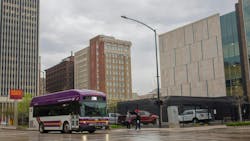Des Moines Area Regional Transit Authority, SDMTS seeing ridership improvements
The Des Moines Area Regional Transit Authority (DART) and the San Diego Metropolitan Transit System (SDMTS) have each seen more residents opting to use public transit to get around, improving ridership levels.
DART
DART reported it has provided 3.5 million rides across all transit services in Fiscal Year (FY) 2024 (July 2023 – June 2024), showing an increase of nearly nine percent from FY 23.
Ridership grew on several DART services during FY 24:
- Local and Express Bus Routes: 3.3 million rides (plus 9.2 percent compared to FY 23)
- DART On Demand: 20,822 rides (plus 33 percent compared to FY 23)
- Paratransit: 101,395 rides (plus six percent compared to FY 23)
“Growing ridership speaks to the value we are providing in helping residents connect to vital destinations across Greater Des Moines,” said Amanda Wanke, DART CEO. “With nearly nine out of 10 trips we deliver resulting in people earning or spending money, we are not just supporting those who use our service, but also driving economic growth and opportunity in our member communities.”
DART’s most used bus service is its fixed routes, with 95 percent of all rides in FY 24 on one of the agency's local and express bus routes. DART's on demand service has had significant ridership growth in Ankeny, Iowa. The agency's paratransit services have also experienced a steady increase in ridership as central Iowa’s population ages.
Large events like the 2024 Iowa State Fair brought in 272,880 shuttle rides during the course of 11 days. This was recorded at the highest number of State Fair shuttle rides provided since DART began offering the Park & Ride service. DART’s 2024 Fair ridership is a 13 percent increase over 2023 and a nearly eight percent increase over the fair shuttle ridership record set in 2019.
DART says this year’s busiest fair day, Aug. 10, was also the busiest day for DART Park & Rides, with a total of 39,943 rides provided. Although this year’s record is significant, State Fair shuttle rides make up just a small portion of DART’s overall annual ridership.
SDMTS
SDMTS ridership has increased during the past fiscal year (July 2023 – June 2024), logging 75.7 million passenger trips, a 10.4 percent increase over FY 23 (68.5 million).
“The recent ridership increase has put [SD] MTS on a path to welcome even more passengers in the coming years,” said Stephen Whitburn, SDMTS Board chair and San Diego City councilmember, District 3. “This success is a testament to the partnership between riders and the dedicated [SD] MTS staff and Board of Directors to improve transit for our region. [SD] MTS is committed to delivering comprehensive transit experience to meet the needs of all our riders.”
Other ridership milestones for SDMTS include:
- Youth ridership increased by 22.7 percent compared to the previous year, logging 6.8 million passenger trips from its more than 113,000 youth riders who use a Youth Opportunity Pass.
- 13 bus routes experienced increases of 20 percent or higher (Routes 14, 25, 83, 833, 851, 854, 872, 891, 906, 907, 946, 964, 985).
- Eight bus routes surpassed the million-trip mark (Routes 7, 13, 215, 929, 201, 202, 30 and 235).
- The highest ridership month in Fiscal Year 2024 was October 2023, with 6,929,191 passenger trips
“We believe the increase in ridership is due to a number of factors,” said Sharon Cooney, SDMTS CEO. “People are working from home less often or not at all, [SD] MTS provides a reliable alternative to driving a car and taking transit is much more affordable than driving. With inflation, rising costs of housing and strained pocketbooks, residents are looking for any way they can to save money. Taking transit is a great way to do that.”
The agency also shared that in May it experienced a week with an average of 271,000 passengers per day, the highest week on record since the onset of the COVID-pandemic. During the pandemic, SDMTS experienced a steep decline in ridership as thousands of residents stayed home. Due to the loss in ridership and because approximately 25 percent of SDMTS’s system operation is supported by fare revenue, the agency is experiencing a multi-million-dollar structural budget deficit.
However, now the public transit agency is experiencing an upswing in its ridership, consistently reaching 85 percent to 90 percent of pre-pandemic ridership, through agency-wide efforts to attract more riders. This required an increase in security presence system-wide and a new Bus Rapid Network route connecting Imperial Beach and Otay Mesa, Calif. Other factors that contribute to growing ridership are workers returning to the office, students returning to school, housing density, special events and more.
About the Author
Eman Abu-Khaled
Associate Editor
Eman Abu-Khaled is a former associate editor with Mass Transit magazine.

